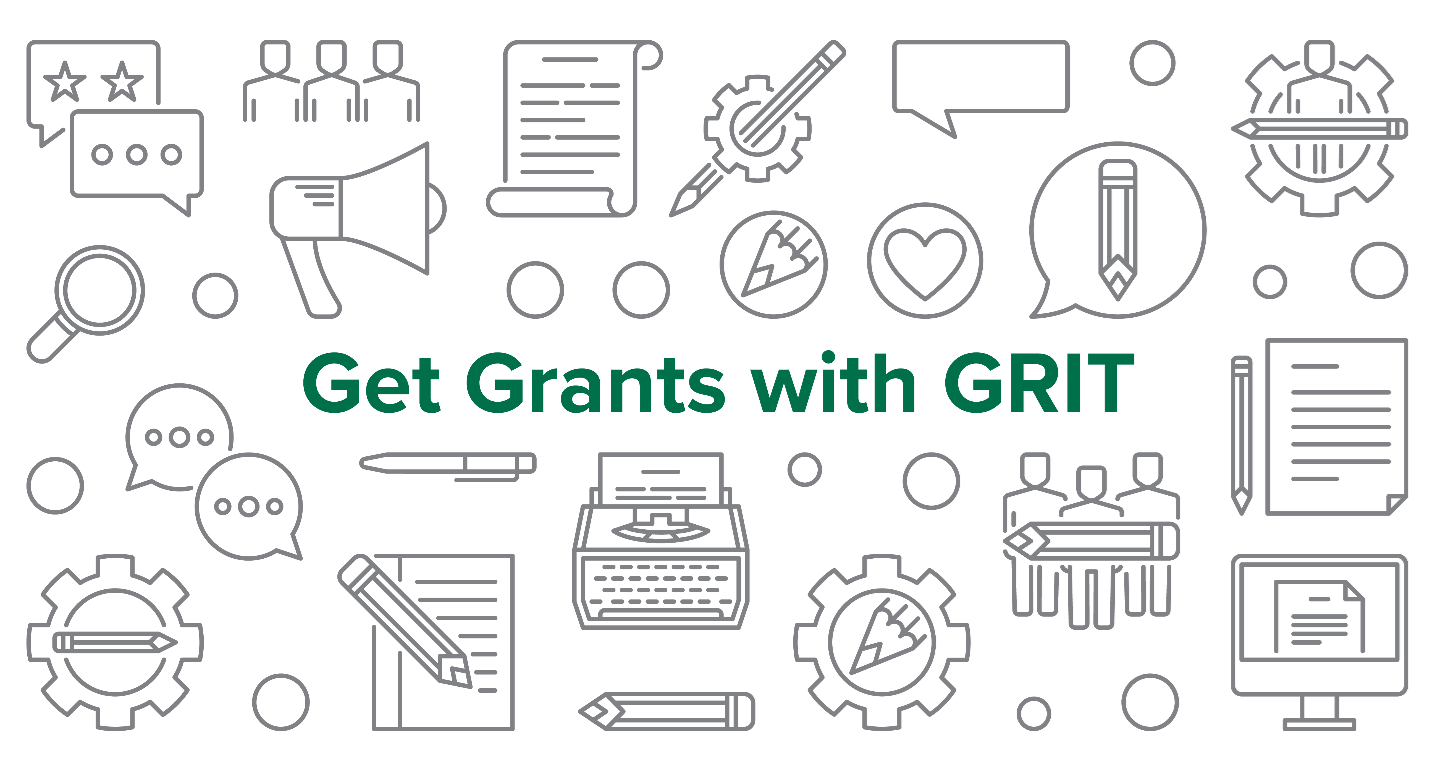-
Thank you for your interest in participating in the GRIT program!
Please provide all information requested in the expression of interest form below. GRIT program leadership will reach out to you about next steps shortly after we receive your expression of interest.
-

-
Grant Writing Intensive Program

The Grant Writing Intensive (GRIT) program is a practicum designed to empower UAB faculty with the knowledge and skills necessary to secure extramural research funding.
Program Structure
- Participants are part of small, focused cohorts of 4-6 individuals.
- Each cohort meets weekly under the guidance of an experienced coach.
- The program begins with 6 months of structured weekly activities, followed by one-on-one sessions as needed for the remainder of the year.
- Participants write and refine one extramural research proposal to be submitted upon program completion.
Program Topics
Weekly sessions are a blend of didactic instruction and practical activities, covering topics including but not limited to:
- Navigating the NIH
- Contacting Your Program Officer
- Project Management for Proposal Development
- Building Collaborative Teams
- Conducting Literature Reviews
- Graphics and Figures to Enhance Storytelling
- Selling Your Significance & Innovation
- Biostatistics
- Budgets, and more!
Program Benefits
- Structured Curriculum: GRIT provides a structured environment that promotes learning and application of best practices in grant writing.
- Individualized Feedback and Support: Participants receive personalized feedback and support from their dedicated coach.
- Accountability: Being part of a cohort fosters a sense of accountability, enhancing the learning experience and boosting motivation.
Program Fee
The current GRIT Program Fee is $4500, due upon enrollment.
Some GRIT participants use start-up or professional development funds to cover the cost of their participation, while others receive sponsorship from their department, division, or center. Please discuss with your Chair to explore funding options that may be available to you.
-
Eligibility
The GRIT program is open to UAB faculty members and select postdoctoral researchers who are pursuing extramural career development (K-series) or research (R-series) awards. Cohorts are grouped based on career stage to provide tailored support and guidance. The curriculum is heavily focused towards NIH applications, but applicants are welcome to pursue comparable federal or foundation funding during the GRIT program.
-
Application and Enrollment Process

-
Expression of Interest: If you’re interested in participating in GRIT, submit an expression of interest using this link.
-
Introductory Call: Program leadership will reach out to delve into your research career and proposal development plans.This call will help determine if the GRIT program aligns with your grant writing goals.
-
Online Application: After completing the introductory call, you can formally apply for the GRIT program. The application involves uploading a biosketch and a specific aims page for your proposed project.
-
Evaluation: Our team reviews applications based on merit and readiness to benefit from the GRIT program.
-
Admission Decision: Within four weeks of the application deadline applicants either receive invitations to enroll in GRIT or receive feedback on how to prepare for future enrollment.
-
Enrollment: If invited, applicants join the GRIT program and are assigned to a group of near peers at the same career stage, along with a dedicated group coach. Participants will receive an invoice for their program fee, due to reserve their spot
Upcoming Cohorts
The GRIT program is offered twice a year, with the Fall cohorts beginning in August and the Spring cohorts beginning in February. It is ideal to enroll in a cohort at least 5 months before your submission due date, though exceptions can be made.
Key dates for the Fall application cycle:
- Introductory calls with program leadership: rolling
- Applications Due: June 30 at midnight
- Admission Decision Notification: July 31
- Enrollment Deadline: August 14
- Fall Cohorts Begins: Late August or early September
- Fall Cohorts End: Late January or early February
Key dates for the Spring application cycle:
- Introductory calls with program leadership: rolling
- Applications Due: November 30 at midnight
- Admission Decision Notification: December 31
- Enrollment Deadline: January 10
- Fall Cohorts Begin: Late January or early February
- Fall Cohorts End: late June or early July
-
-
Grant Writing Intensive Program
-
GRIT Successes:
-
Year 1: 2018

Tiffany Carson, PhD, MPH
School of Medicine
GRIT Cohort 2018National Cancer Institute
Grant Mechanism: R01
Years Funded: 2021-2025
Project Title: Determining the structural- and functional-level effects of diet-specific interventions on the gut microbiota of a diverse sample of Southern United States adults
National Institute of Diabetes & Digestive & Kidney Diseases
Grant Mechanism: R01
Years Funded: 2021-202
Project Title: Improving weight loss outcomes of black women using a culturally relevant, stress management enhancement behavioral weight loss intervention
Crystal Chapman Lambert, PhD
School of Nursing
GRIT Cohort 2018National Center for Complementary & Integrative Health
Grant Mechanism: K23
Years Funded: 2019-2023
Project Title: Feasibility of the Mindfulness-Based Stress Reduction Intervention for Black Women Living
with HIV
Bertha Hidalgo PhD, MPH
School of Public Health
GRIT Cohort 2018National Heart Lung & Blood Institute
Grant Mechanism: R01
Years Funded: 2022-2025
Project Title: Epigenetic biomarkers of preeclampsia risk among mothers with chronic hypertension
Christina Muzny, MD
School of Medicine
GRIT Cohort 2018National Institute of Allergy & Infectious Diseases
Grant Mechanism: R21
Years Funded: 2021-2023
Project Title: The Impact of Testosterone Use on the Vaginal Microbiota in Transgender Men, including Susceptibility to Bacterial Vaginosis
National Institute of Allergy & Infectious Diseases
Grant Mechanism: R01
Years Funded: 2020-2025
Project Title: Microbial Interactions between Gardnerella, Prevotella, and Atopobium Prior to Incident Bacterial Vaginosis
Aadia Rana, MD
School of Medicine
GRIT Cohort 2017National Institute of Allergy & Infectious Diseases
Grant Mechanism: R01
Years Funded: 2018-2023
Project Title: Geographic Variability in Time from HIV Diagnosis to Viral Suppression in the Deep South: A Roadmap to Accelerated Treatment Initiation -
Year 2: 2019

Nicole Bentley, MD
School of Medicine
GRIT Cohort 2019National Institute of Neurological Disorders and Stroke
Grant Mechanism: K23
Years Funded: 2021-2026
Project Title: Investigating Inhibitory Control Networks in Parkinson's Disease
Kaylee Crockett, PhD
School of Medicine
GRIT Cohort 2019National Heart Lung & Blood Institute
Grant Mechanism: K23
Years Funded: 2021-2026
Project Title: Adaptation and Pilot Testing a Behavioral Physical Activity Intervention with Peer Support for Women with HIV and Co-Occurring Hypertension
Latesha Elopre, MD
School of Medicine
GRIT Cohort 2019National Institute of Mental Health
Grant Mechanism: R34
Years Funded: 2021-2024
Project Title: PrEP 4 Her: Developing a Novel Strategy to Implement PrEP into Women's Healthcare
Faith Fletcher, PhD
School of Public Health
GRIT Cohort 2019National Human Genome Research Institute
Grant Mechanism: K01
Years Funded: 2021-2024
Project Title:
Developing Evidence-Based Guidance for Engaging Rural Residents in the Deep South in Genomics Research: A Stakeholder-Driven Perspective
Trisha Parekh, DO
School of Medicine
GRIT Cohort 2019National Heart Lung & Blood Institute
Grant Mechanism: K23
Years Funded: 2020-2025
Project Title: Development of a Community Health Worker-Led Stress Reduction Intervention for Low-Income COPD Patients
Gabrielle Rocque, MD
GRIT Cohort 2019
National Institute of Nursing Research
Grant Mechanism: R01
Years Funded: 2021-2026
Project Title: Evaluating the implementation and impact of navigator-delivered ePRO home symptom monitoring and management
Michael Seifert, MD
School of Medicine
GRIT Cohort 2019National Institute of Diabetes and Digestive and Kidney Diseases
Grant Mechanism: R01
Years Funded: 2020-2025
Project Title: Clinical and Molecular Biomarkers of Endpoints in Pediatric Renal Transplantation -
Year 3: 2020

Ronnie "Matt" Gravett, MD
GRIT Cohort 2020
National Institute of Mental Health
Grant Mechanism: K23
Years Funded: 2022-2027
Project Title: Amplifying Our Voice: Understanding HIV PrEP Promotional Messaging to Create Authentic PrEP Content by Men Who Have Sex with Men in the Deep South
Karin Hardiman, MD, PhD
School of Medicine
GRIT Cohort 2020National Cancer Institute
Grant Mechanism: R01
Years Funded: 2022-2027
Project Title: A novel, transferable sialylation-mediated mechanism of chemoradioresistance in GI cancer
Samantha Hill, MD
School of Medicine
GRIT Cohort 2020National Institute of Mental Health
Grant Mechanism: K23
Years Funded: 2022-2027
Project Title: Integration of Trusted Adult Supports into the HealthMpowerment App to Improve Black Adolescent and Young Adult PrEP Use
Brandi Pernell, DNP
GRIT Cohort 2020
School of Medicine
Grant Mechanism: K23
Years Funded: 2022-2027
Project Title: Promotion of Exclusive Breastfeeding in Children with Sickle Cell Disease for Improved Health Outcomes
Caroline Presley, MD, MPH
School of Medicine
GRIT Cohort 2020National Center for Complementary & Integrative Health
Grant Mechanism: K23
Years Funded: 2022-2025
Project Title: Mindfulness-Based Diabetes Education for adults with elevated diabetes distress
Rachel Sinkey, MD
School of Medicine
GRIT Cohort 2020American Heart Association
Grant Mechanism: Health Equity Research Network on Prevention of Hypertension (HERN)
Years Funded: 2022-2026
Project Title: P3 Providing an Optimized and emPowered Pregnancy for You (POPPY)National Heart, Lung, and Blood Institute
Grant Mechanism: K23
Years Funded: 2022-2027Project Title: The ACHIEVE Trial: Achieving longer gestation in preeclampsia via antihypertensive therapy.
-
Year 4: 2021

Abigail Hernandez, PhD
School of Medicine
GRIT Cohort 2021
Grant Mechanism: K99
Years Funded: 2022- 2027
Project Title: Influence of gut on metabolism and cognition in Alzheimer's disease
Ashley Holder, MD
School of Medicine
GRIT Cohort 2021
Melanoma Research Foundation
Grant Mechanism: Young Investigator Research Team Award
Years Funded: 2022- 2024
Project Title: Macrophage Regulation of the Tumor Microenvironment in Metastatic Melanoma
American College of Surgeons
Grant Mechanism: George H. A. Clowes, Jr., MD, FACS, Memorial Research Career Development Award
Years Funded: 2021-2026
Project Title: Macrophage Regulation of the Tumor Microenvironment in Metastatic Melanoma
Carrie Howell, PhD, MPH
School of Medicine
GRIT Cohort 2021National Institute on Minority Health and Health Disparities
Grant Mechanism: K01
Years Funded: 2022- 2026
Project Title: Harnessing Social Determinant of Health Data to Identify and Engage High Risk, Socially Vulnerable Populations for Diabetes PreventionAmerican Heart Association
Grant Mechanism: Career Development Award
Years Funded: 2022- 2025
Project Title: Assessing Populations at High Risk for Major Cardiac Events using Social Determinant and Cardiometabolic data (AT-RISC)
Nicole Wright, PhD, MPH
School of Public Health
GRIT Cohort 2021
Grant Mechanism: R01
Years Funded: 2023-2028
Project Title: Evaluating the Association between Cardiometabolic Health Over the Lifespan and Vertebral Strength -
Year 5: 2022

Ryan Coute, DO
School of Medicine
GRIT Cohort 2022Grant Mechanism: K23
Years Funded: 2023 - 2028
Project Title: Improving Community-level Bystander Cardiopulmonary Resuscitation in Underserved Populations
Yulia Khodneva, PhD
School of Medicine
GRIT Cohort 2022Grant Mechanism: K23
Years Funded: 2023 - 2028
Project Title: Improving diagnosis of heart failure with preserved ejection fraction in primary care
Megan Leask, Ph.D.
School of Medicine
GRIT Cohort 2022Grant Mechanism: NIAMS Diversity Supplement
Years Funded: 2022 - 2024
Project Title: Functional and Integrative Omics of Recurrent Gout Flares
Rachel Skains, MD, MSPH
School of Medicine
GRIT Cohort 2022Grant Mechanism: R03
Years Funded: 2023 - 2025
Project Title: Risk Factors and Time Course of Incident Delirium Among Older Adults in the Emergency Department (ED)Grant Mechanism: R21
Years Funded: 2023 - 2025
Project Title: Comprehensive Assessment of Delirium Risk due to Medications -
Year 6: 2023

Stephen Clarkson, MD
School of Medicine
GRIT Cohort 2023Grant Mechanism: American Heart Association Career Development Award
Years Funded: 2023-2026
Project Title: Social Determinants of Health among Rural Patients with Cardiovascular Disease
Chinenye Dike, MD
School of Medicine
GRIT Cohort 2023Grant Mechanism: K23
Years Funded: 2024-2029
Project Title: A Double Blinded Randomized Feasibility Trial on the Use of Plant Based Omega-3-Fatty Acids (Flaxseed) to Improve Inflammation Driven Pain Outcomes in Children with Sickle Cell Anemia
Lily Gutnik, MD
School of Medicine
GRIT Cohort 2023Grant Mechanism: K08
Years Funded: 2025-2030
Project Title: Global Breast and Cervical Cancer Control: Implementing a Bundled Screening Approach in a Resource Limited Setting
Raymond Jones, PhD
School of Medicine
GRIT Cohort 2023Grant Mechanism: K01
Years Funded: 2024-2028
Project Title: A Pilot Trial of High-Intensity Exercise to Combat Vascular and Cognitive Dysfunction in Older Adults with HIV
Courtney Williams, DrPH
School of Medicine
GRIT Cohort 2023Grant Mechanism: K01
Years Funded: 2025-2030
Project Title: Evaluating the implementation and impact of standard-of-care delivered oncology financial navigation
-
Year 1: 2018
-

Andrea Cherrington, MD
Professor, Preventive Medicine
Gareth Dutton, PhD
Professor, Preventive Medicine
Larry Hearld, PhD
Professor, Health Services Administration
Renee Heffron, PhD
Professor, Infectious Diseases
Nataliya Ivankova, PhD
Professor, Health Services Administration
Alayne Markland, MD
Professor, Gerontology, Geriatrics, and Palliative Care
Tapan Mehta, PhD
Professor, Health Services Administration
Michael Mugavero, MD
Professor, Infectious Diseases
Gabriela Oats, PhD
Associate Professor, Pulmonary & Sleep Medicine